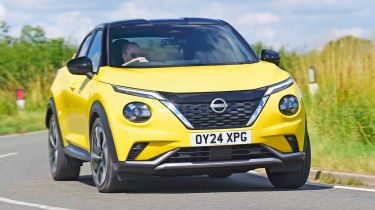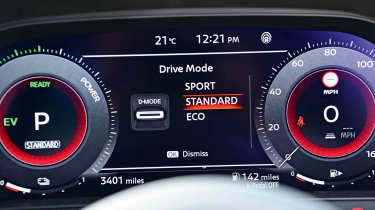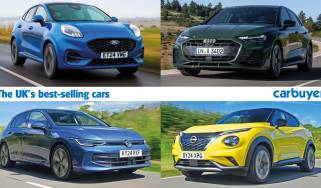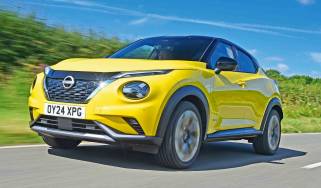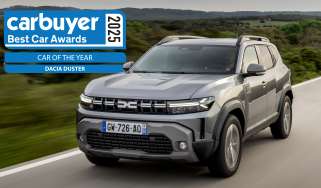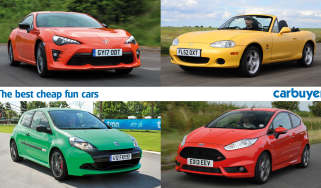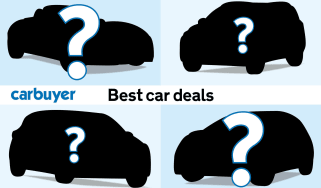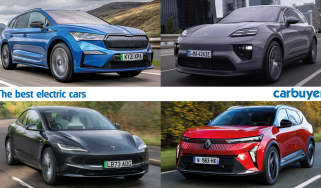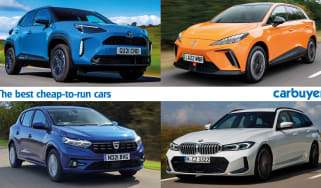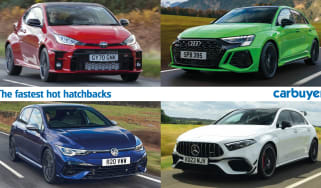Nissan Juke review - Engines, drive & performance
"Underpinnings shared with the Renault Clio result in tidy handling"
The previous-generation Nissan Juke may have looked striking and its high riding position appealed, but it was never very good to drive. Nissan has addressed those issues, though, making the latest Juke much more fun, and capitalising on its shared underpinnings with the Renault Clio – that said, the Ford Puma is still much more fun to drive overall
We’ve driven the standard petrol model and a post-facelift version of the hybrid. We like the Juke’s steering as it feels well-weighted and responsive, though it could do with a little more feedback.
The hybrid is at its best when running on electricity – it can do this up to speeds of 31mph, and when the combustion engine kicks in, it’s not the most refined unit, producing quite a harsh noise under heavy acceleration. The Juke is best suited to calm and gentle driving, and its electric motor is smooth to set off from a standstill, making it good in stop/start traffic.
As before, the facelifted Nissan Juke features a fairly firm ride – our test car was fitted with 19-inch wheels, but the 17-inch items of the base model are likely to improve the ride somewhat. Nissan also redesigned the seats as part of the update, and these help to improve comfort on long journeys. Visibility and airiness are better than that of the Toyota CH-R thanks to lower window lines.
Petrol engines
The Nissan Juke is available with one petrol, which currently makes up the bulk of sales. Luckily the 1.0-litre DIG-T is a decent engine, which would likely be the top seller even if more choices were offered. Small, turbocharged and producing 112bhp, it feels modern and offers a good blend of performance and low running costs. Acceleration from 0-62mph isn't its strong point, taking 10.7 seconds, but in practice, it feels more than sprightly enough for the Juke. There's an ‘Eco’ driving mode that saves fuel but noticeably affects the car’s performance.
More reviews
We weren't quite as enamoured with the six-speed manual gearbox, which we found fairly notchy compared with the sweet-shifting gearbox in the Mazda CX-30. It also emitted some transmission whine, which was noticeable while cruising on the motorway and was one of the few noises in an otherwise refined interior. We also had reservations about the seven-speed automatic gearbox, as although it improved in its Sport mode, it was occasionally jerky at slow speeds – this gearbox propels the Juke from 0-62mph even more slowly, taking 11.8 seconds.
Hybrid engine
A hybrid version of the Nissan Juke was a welcome addition to the range, featuring 141bhp from a 93bhp 1.6-litre engine paired with a 48bhp electric motor, and is automatic-only. That makes it quicker off the line than the standard petrol, although a 0-62mph time of 10.1 seconds is still not particularly exciting, and efficiency is the name of the game here. We didn’t particularly like the hybrid’s gearbox, which felt a bit slow to select the correct gear in any of the driving modes.
Regenerative braking is a feature on the hybrid, and takes energy that would otherwise be lost by slowing down and uses it to charge the Juke’s battery. At a relaxed pace you can accelerate using only electric power, but ask for a quicker response and the petrol engine has to kick in.
Which Is Best?
Cheapest
- Name1.0 DiG-T Acenta Premium 5dr
- Gearbox typeManual
- RRP£23,500
Most Economical
- Name1.6 Hybrid N-Connecta 5dr Auto
- Gearbox typeAuto
- RRP£29,095
Fastest
- Name1.6 Hybrid N-Connecta 5dr Auto
- Gearbox typeAuto
- RRP£29,095

